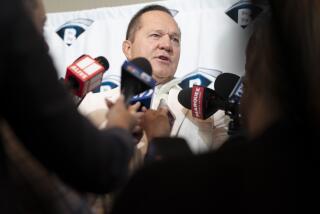Strike’s Own Squeeze Play : Managers and Coaches Dislike Being Caught in the Middle Between Players and Owners
- Share via
SCOTTSDALE, Ariz. — As he scans a field of players, trying to remember names and faces, Manager Dusty Baker of the San Francisco Giants says one thing is certain in an uncertain spring.
“This is still Matt Williams and Barry Bonds and Royce Clayton and Robby Thompson’s house,” he says. “Whoever we have here in the meantime is only a renter.”
Caught in the middle between striking regulars and replacements, between union and management, managers and coaches are virtually the only uniformed link to major league baseball in a spring clouded by the ongoing strike.
Sparky Anderson decided he couldn’t work with replacement players and took an unpaid leave as manager of the Detroit Tigers, with no guarantee he will be retained when the strike ends.
The Toronto Blue Jays have excused Manager Cito Gaston and his coaches from working with the replacement team. The Baltimore Orioles refuse to field a replacement team, leaving rookie Manager Phil Regan to supervise minor leaguers.
The other major league managers are caught in conflicting loyalties. They are paid by their clubs but are also dues-paying members of a union that provides their pensions and health plans and yearly licensing checks that can total $80,000 or more.
“They are caught between the proverbial rock and a hard place,” union leader Donald Fehr said in Phoenix on Saturday, after a 2 1/2-hour meeting with Arizona-based managers, coaches and trainers.
“I have no doubts where their sympathies lie--many were active union leaders as players--but you have to remember that it’s the clubs that are saying, ‘You have to do this. You have to work with these players, or we will fire you.’ ”
Fehr denied that the union has threatened the managers, coaches and trainers with loss of their union benefits, adding, “I think what Sparky did was an act of principle that sent a message that has many people thinking, but we have not asked or urged other managers to do what he did. People have to do what they think is best in their own circumstances.”
Said Angel Manager Marcel Lachemann, “My job is to manage this club. I was hired to do that. Each manager and coach has to decide for themselves. If they’re uncomfortable, they shouldn’t do it. I don’t feel I have a choice. I either work or don’t have a job.”
Managers Buck Showalter of the New York Yankees and Felipe Alou of the Montreal Expos have said they are not certain they will manage exhibition games involving replacement players, but Baker said:
“Most of us don’t have the leverage and clout of Sparky Anderson. He’s managed for 25 years. I’ve managed for less than two. If I get fired for refusing to manage and end up blackballed, will the union get me a job?”
Nine of the 28 managers have been major league managers for less than two years, another four for less than three.
Don Baylor, starting his third year as Colorado’s manager, is discouraged about the prospects of a settlement soon but said:
“I don’t feel used. If I felt (refusing to manage) would make a difference, I would, but I feel my place is working with the minor leaguers, which is what I’m doing. Sparky felt he had to make a stand, but I don’t think it was appropriate or necessary to make that stand now. I still believe the collective bargaining process will work, and that all of this will be behind us by opening day. That’s my belief and hope anyway.”
Oakland Manager Tony La Russa, who has some of the same leverage and clout as Anderson, said he considered the issues and concluded that his defection would have been academic.
“The game comes first,” he said. “Everybody else’s interests follow. The game suffers because we’re not on the field. I think fans understand that we have to be out there. I think the (striking) players understand it.
Baker agreed.
“I talk to guys like Matt and Barry and Robby on a regular basis, and to a man they say, ‘Hey, Bake, we know where you’ve been, where you’re coming from on this,’ ” he said. “I have a responsibility to those guys to stay with it and prepare this team as best I can. I don’t want to be 10 or 20 games out when they come back.
“I hope it doesn’t take that long, but who knows? I tell those guys to stay ready, stay in shape, because there’s going to be baseball again. We just don’t know when.”
More to Read
Go beyond the scoreboard
Get the latest on L.A.'s teams in the daily Sports Report newsletter.
You may occasionally receive promotional content from the Los Angeles Times.










